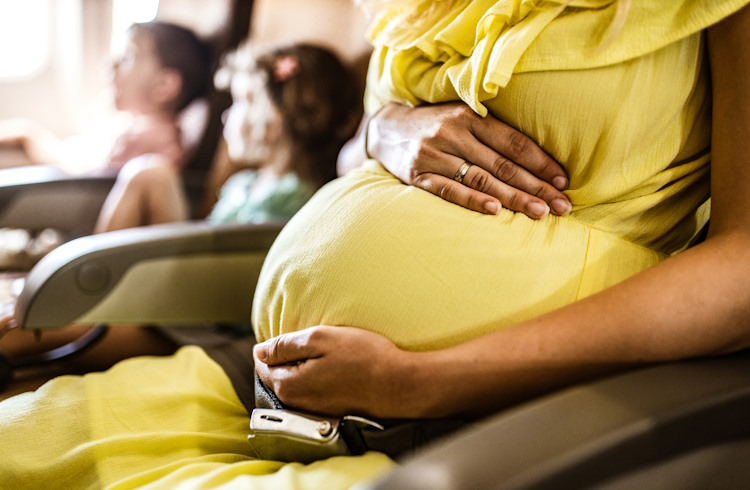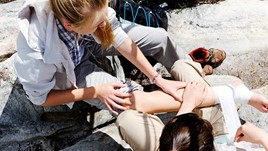How to Travel With Confidence When You're Pregnant
Having a baby? Plan ahead before boarding a cruise ship or jetting off on vacation and take these extra precautions to ensure you stay well, advises travel writer and mother of two, Joanna Tovia.
 Photo © Getty / Sara Monika
Photo © Getty / Sara Monika
- The benefits and challenges of a babymoon
- Flying while pregnant
- Cruising while pregnant
- Staying healthy on vacation
- Staying safe while traveling
- If things go wrong
The benefits and challenges of a babymoon
Having already had one baby, I knew what I was in for during those first few exhausting months – the lack of sleep, the round-the-clock care, the hormonal upheaval – only this time I’d be doing it with a go-go-go five-year-old in tow.
A babymoon to Thailand during pregnancy number two seemed like just the thing for some pre-birthday fun and relaxation.
It was fun and relaxing and I’m glad we went, but traveling while pregnant (six months along, in my case) meant taking additional care to ensure we all stayed safe and well. I already knew to avoid raw fish and soft cheese (bummer), would obviously be avoiding alcohol (no beachside cocktails this trip), and my vaccinations were up to date – but there were some unexpected hiccups during the trip that dictated what I could and couldn’t do.
For starters, I’d forgotten just how hot and humid it could get in Thailand, so the gallons of water my body was already demanding I drink skyrocketed and I found it all but impossible to leave the cool (okay, cold) air of the hotel room during the hottest hours of the day. Even in the early morning or late afternoon, I needed to spend the majority of my time in the pool to stay cool.
I was right to be concerned about overheating. According to the American Heart Association, heat stroke, dehydration, and heat exhaustion can lead to fainting, headaches, muscle cramps, nausea, and dizzy spells in pregnant women, whose bodies are already working hard to support a growing baby. Dehydration during pregnancy can affect amniotic fluid levels, prompt the onset of Braxton Hicks (those pesky false labor signs nobody wants to worry about on vacation) and cause other problems for you and your unborn baby.
Below are some tips for planning your own travel. The number one tip though it to get travel insurance and to understand how it covers you should something unexpected come up while you are away from home.
Flying while pregnant
If your doctor has given you the green light for air travel and you’ve checked the cut-off dates with your airline (some won’t allow you to travel past the 28-week mark, while others draw the line at 36 weeks), most pregnant women can travel safely by plane.
Pregnancy complications such as gestational diabetes, high blood pressure, or placenta abnormalities are reasons not to travel, according to the Victorian Department of Health, which also advises against travel if you are over 35 and pregnant for the first time. Carrying more than one fetus, or prior pregnancy issues (miscarriage, premature labor, pre-eclampsia) are other reasons to reconsider travel.
Try to book an aisle seat for those extra trips to the restroom and request a bulkhead row for the extra legroom it provides. You won’t be seated in an emergency exit row if you’re pregnant, or will be relocated to another seat if a flight attendant sees that you are.
Pregnant women are more at risk of deep vein thrombosis (DVT) than others during long periods of sitting (whether on planes, trains, buses, or in a car), so walk around when you can, exercise your legs when seated, and drink plenty of water. Wearing compression stockings, as I did, during the flight keeps swelling down and reduces the risk of DVT.
Oh, and secure your seatbelt under your bump across your lap in case of sudden turbulence. Our ultra-low-budget, ultra-uncomfortable plane bucked its way through the sky on our return journey to the point that one flight attendant made a sign of the cross and said a Hail Mary.

Cruising while pregnant
A cruise can be a relaxing way to travel during pregnancy, but there are some important considerations to think about before booking your trip. Cruise lines have different policies regarding pregnant travelers, with many refusing to allow passengers aboard if they have entered their 24th week of pregnancy on the date of embarkation or will do so during the cruise.
Always check the cruise line's policy before booking to avoid any last-minute disappointment and bring a letter from your doctor confirming your due date and stating that your pregnancy isn’t high-risk.
Keep in mind that river cruise lines are rarely as strict as ocean cruise lines, with many leaving it up to you and your doctor to decide on whether it’s safe for you to go on a cruise.
While cruise ships have medical facilities, they may not be equipped to handle pregnancy complications. Choose an itinerary that stays relatively close to land, where access to a high standard of medical care is available if needed. It’s also worth checking if your travel insurance covers pregnancy-related medical care on a cruise, as some policies exclude it.
Seasickness can be exacerbated by pregnancy nausea, so pack pregnancy-safe remedies like ginger tablets, acupressure wristbands, or doctor-approved motion sickness medication. Be mindful of food safety while onboard, particularly at buffets, and stay hydrated by drinking plenty of bottled or filtered water.
Staying healthy on vacation
If you’re still deciding where to go on vacation, we have some suggestions.
- Seek out destinations that offer easy access to high-quality medical care.
- Avoid going to developing countries while pregnant if you can – the risk of traveler’s diarrhea, food poisoning, and other illnesses is higher, and it can be more difficult to find a high standard of medical treatment when you need it. Tropical countries with a risk of malaria, zika, dengue fever, yellow fever, and other mosquito-borne diseases should be avoided – pregnancy-safe prevention and treatment can be elusive.
- Food safety precautions are extra important when you’re pregnant, especially when you’re traveling overseas. Avoid ice in your drink, skip the buffet, ensure chicken and meat is fully cooked, and take a pass on seafood, pate, and soft cheeses. Drink (and brush your teeth with) bottled water if you’re unsure of the water supply, or use a water purifier/filter.
- Check with your doctor and travel insurer before taking part in sporting activities, especially those underwater or at high altitudes. This is not the time for high-octane adventure sports, no matter how energetic you may be feeling.
If things go wrong
Preparing for the worst before you leave home is the smartest approach, and that includes locating where you’d go for emergency obstetric and other hospital care, finding out what your travel insurance would cover you for, and what (if any) reciprocal agreements are in place for medical care between your home country and the destination to which you’ll be traveling.
If you’re taking medication:
- Be sure you have enough and plan what you’ll do if you lose it while you’re away.
- Take medication on board in your carry-on luggage if you can.
- Pack a first-aid kit containing everything from painkillers and pregnancy multivitamins to pregnancy-safe treatment for diarrhea.
- Don’t assume medications available over the counter or by prescription are similarly available in other countries – what’s easy to access at home may be hard to come by or even illegal in another.


No Comments